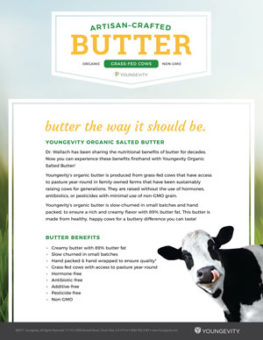Why Butter is Better When It’s Grass-Fed & Organic
Posted: December 12, 2017 | By: Rocio Ramos

A spoonful of butter is the answer
In the early 1900s, butter was one of the most consumed dairy products. Americans were consuming about 18 pounds of creamy butter per year. Fast forward to the end of the 1990s and many Americans were running away from all forms of fat, including butter. During this period, butter and other fats were blamed for obesity, heart disease, and many other illnesses. Wrongly blamed, studies now show that butter and other healthy fats are not to blame for these health problems. It turns out that butter is actually a great source of fat and it’s okay to eat more butter!
Who gave butter such a bad rep?
Remember back in the 90s, when fat became the enemy and low-fat foods were all the rage? It was then that the USDA set nutritional standards that went on to shape the future of butter and fats for the next two decades. Now, we know that sugar, grains, and trans fats are responsible for weight gain and cardiovascular disease, not saturated fats and monounsaturated fats such as butter, lard, nuts and fish. You can read more about the health benefits of fat in “A High Fat Diet Could Be the Key to Weight Loss.”
Butter vs. oils
The misconception of butter being bad for your health is mostly due to unhealthy sources of fat such as oils, margarines, and other forms of trans or partially hydrogenated fats. While many oils oxidize and turn into trans fat at high temperatures, butter is very temperature stable and more resistant to oxidative damage when exposed to heat. This makes butter a preferred choice when cooking and also has important roles it plays within the body.
Butter is an excellent source of saturated fat and cholesterol. Saturated fats are known to support critical metabolic functions including promoting nutrient absorption and immune function and helping to protect against oxidative damage. Additionally, the body requires ample amounts of cholesterol for building and maintaining cell membranes, metabolizing fat-soluble vitamins, producing bile to help digest fat, and helping to synthesize a variety of hormones. Check out “The Definitive Guide to Cholesterol” to learn more about the importance of cholesterol in your diet.
Dr. Wallach says “Eat more butter”
For decades, Youngevity founder Dr. Joel Wallach has shared the benefits of healthy fats and cholesterol. Butter has been fundamental in Dr. Wallach’s nutritional beliefs and recommendations. According to Dr. Wallach, butter is a great source of minerals, vitamins, cholesterol, and conjugated linoleic acid (CLA), all of which play essential roles in your overall health. While many nutritional experts were telling individuals to avoid butter, Dr. Wallach has always encouraged the consumption of grass-fed, organic butter.
Grass-fed butter is better
Though butter is a healthy source of fat, the source of the butter is substantially important. Butter made from the milk of grass-fed cows has been shown to have higher amounts of vitamins, minerals and CLA than standard butter according to “7 Benefits of Grass-Fed Butter Nutrition.” When consuming butter, or any other dairy product, be sure to look for organic, grass-fed sources.
Youngevity butter is made from grass-fed cows that have access to pasture year-round. Cows are raised under the most optimal conditions with minimal grain included in their diet that allows for lower calorie, higher nutrient dairy products. The cows can be outside when they want to be outside, under the shade on warm days, or inside when there is snow on the ground. They are humanely raised without the use of antibiotics, hormones, additives or pesticides. Youngevity butter is the best sourced butter with 89% butter fat. Get your Youngevity butter now at Youngevity.com.
Give your body the healthy fat it needs; give it grass-fed butter!
Learn more about Youngevity’s grass-fed butter by downloading the PDF below. And don’t forget to share benefits of grass-fed butter with your friends and family using the social squares below!

Posted in:

